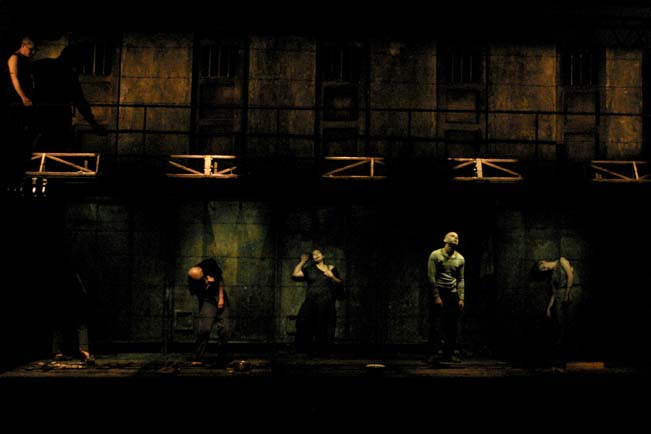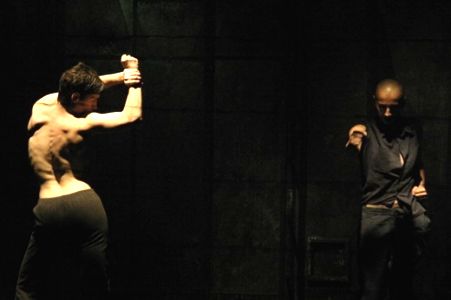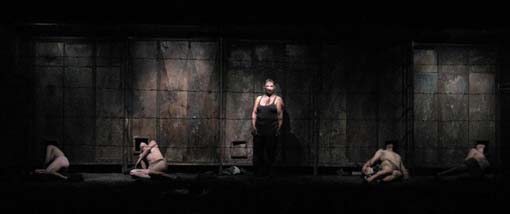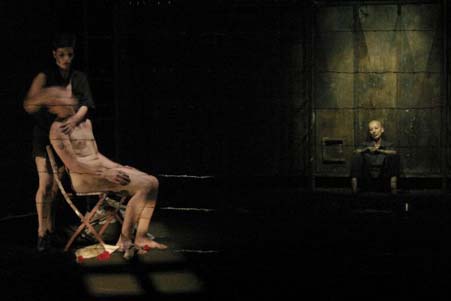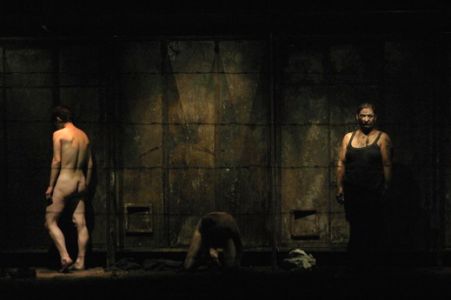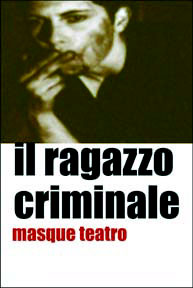
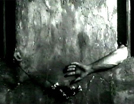
with Eleonora Sedioli, Caterina Cidda, Federica Cangini
Catia Gatelli, Lorenzo Bazzocchi
scene Lorenzo Bazzocchi, Eleonora Sedioli
sound and light Lorenzo Bazzocchi
technique Andrea Basti
graphic project Eugenio de Begnak
photos Chiara Sbrana
organization Catia Gatelli, Rosanna Lama
production Associazione Culturale Masque
ideation and direction Lorenzo Bazzocchi
Now you will drift in your sleep.
The floor is filthy, there are moving things. In this state of never surrender you will be here and elsewhere at the same time.
consistent and inconsistent at the same time. When the body falls….
It falls on slanting lines. The head turned backwards, the hands touching the ground. Falling downwards as if you were never-endingly rising.
In a dream that escapes from us every night and every night originates again.
Como bambini
But now what matter is the rhythm of awakenings. An awakening every minute. Ten awakenings.
Making a rapid calculation with the spelling-book we will have ten minutes for this sleep. Obviously, as I know the story, I will go on, leaving the tape run. I could see them… there on the barbed wire… one was dragging the other and the other was dragging him… out of their nightmare. Two words remained on the ground.
Multitudes and death.
The former, which now doesn’t seem to remind us of anything, appears on the horizon.
The letter instead, the word death, seems to relegate us to our end. Hanged if I don’t kick and punch you and strangle you with my own hands.
I like to compare hard people to actors.
The time passes and, as I lost count of the awakenings, it’s up to you to decide on your destiny.
Obviously when the character in the centre wakes up, you will see a new day.
Anyway I will be here.
They wake up with a start, the floor is dirty and wet, something is moving. In total isolation, their lives seem to recall us to the duty of punishment, they are longing for it to be the most cruel as possible… L’ Enfant Criminal is that who forced a door leading to a forbidden place. He wants this door to open on the finest view of the world: he wants detention - that he has tried so hard to win - to be terrible. In a few words, he wants it to be worthy of all the efforts he has done to win it.
This is what the director says to his guys, to the actors who have created loneliness in their cells without walls, as if they did not see each other. And that destroys the common language, the convention according to which textual relation is the only chance to survive. It is not necessary for us to compare their cells with those of a prison. This is, of course, a place of separation, a place of inner loneliness, a dirty, mouldy, damp place, lacking of any reference mark. This is like an inner architecture, where the actor runs the risk of being disgusted by his feeling at ease in it.
The actors find in themselves the conditions necessary for the nightmare of desire. The man who observes them, that is their jailor, is only ferrying their human nature towards somewhere else, towards the place where the violence of the system that is afflicting them seems to be crashing till it vanishes in a song of love.
